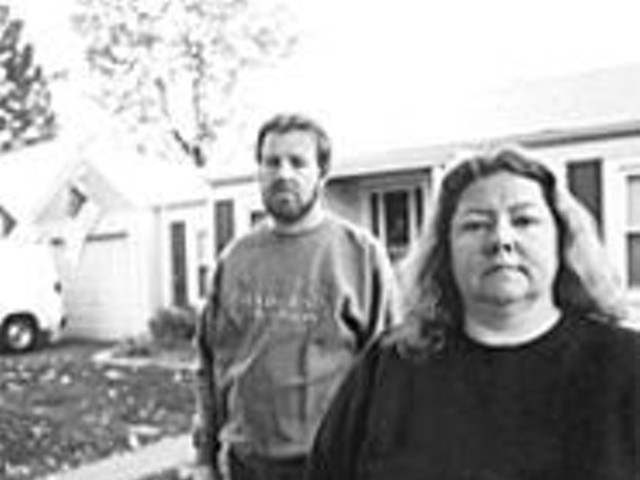But is all that travail reason enough to move to Dayton?
For Eddie Roth, apparently it is. Of course, it's not that simple, as the loquacious Roth can explain -- at length. A neighborhood activist and lawyer who survived three years on the five-member board, Roth will be leaving in January to move to the lower-profile Ohio city (metro population 1 million) to work as an editorial writer and commentator for the Dayton Daily News. It's a way, Roth says, to combine "avocation with vocation" and, just as important, to be home more often for supper with his wife and three daughters.
Some thought Roth's good works in the Shaw neighborhood -- where he spearheaded lawsuits against deadbeat landlords -- and his time on the police board meant he was wanted for a paying job in politics. Not so. "I would no sooner run for public office than I would sell hotdogs on the moon," Roth says. Stranger still, he likes newspapers. (Wait till he gets inside the belly of the beast.) But whatever his motivation, the Lindbergh High grad will soon have St. Louis in his rearview mirror.
After several run-ins with Roth, who leaves as vice president of the board after having served as president, the St. Louis Police Officers Association tried to make sure the door hit Roth in the ass on his way out. In the current issue of the association's magazine, Gendarme, SLPOA treasurer Patrick Rice writes that the group's executive board voted to offer $1,000 to Roth to cover moving expenses if he resigned "immediately" and moved "as soon as possible" instead of waiting until January.
SLPOA may have legitimate gripes about Roth, but they are not mentioned in this stunt. Roth tried to amend the rigid residency requirements for police and spoke openly about the need for the region to financially assist the department. And he stepped down as board president so that the Rev. Maurice Nutt, an African-American priest, could take over, thereby maintaining the board's delicate racial balance as Chief Ron Henderson, also of African lineage, was replaced by Joe Mokwa, who is of the Caucasian persuasion.
Roth dismisses Rice's letter and much of the grief he got from what appeared to be the rank-and-file as the venting of a few "dyspeptic" cops. "There's about 20 guys, tops, who are just bitter, sad cases and have antipathy for the Board of Police Commissioners that has nothing to do with who's on the board," says Roth. "They think we're like the guys in Monopoly, sitting in the backroom with our spats and top hats, smoking cigars, trying to think up new ways to screw police officers. It's pitiful and not widely shared."
Such demonizing of the board falls into what Roth describes as the "comic book" interpretation of reality. "Many of the players, including some journalists, prefer this kind of comic-book version of life," says Roth. "It's two-dimensional; there's no nuance at all. There's no interest in understanding the complexity that goes into many things. They just want to splash and trash."
Complexity has its own hazards, as Roth found out. One member of the political cognoscenti gives Roth points for trying to take on problems but adds, "Unfortunately, some of these problems aren't solvable." Tackling the residency requirement is like jumping on a live grenade -- noble, but you just get blown up. City residents, already enduring or enjoying life in the city, don't want to let police live in the 'burbs. Roth's proposal was to let police with 20 years on the force live outside the city limits. Not only did that idea go nowhere, it irritated the uniformed officers who want the option earlier in their careers, when their children are school age.
The other high-profile flashpoint flared earlier this year, when Roth went public with the need for regional financial support of the St. Louis Police Department. The department's $120 million budget takes up roughly a third of the city's revenues. Roth calmly predicts that in about five years will come a "reckoning" about the city's ability to field a major metropolitan police department: "That's why I got out there this spring, putting the word out that the region has some time to work it out, but if it doesn't find a way regionally to fund public safety, there are going to be some real problems."
Roth may sound like a Cassandra, but he's right: The city's revenues grow by 1 to 3 percent each year. He says that's not enough to keep up with the needs of a police force that does the "heavy lifting" for the metro area. "The city is the center of gravity, for better or for worse," says Roth. "The region has decided it wants to concentrate its poor people -- and, hence, people less stable and more prone to crime and disorder -- in the city of St. Louis. You can't put that challenge before a municipality without helping to assume the cost of public safety. It's pay now or pay later."
Surely the department's getting federal money last week to start patrolling public housing projects shows what's ahead. But Roth's idea went over like a fart in church. No followed his lead. Roth found out that in this comic-book town, there is no Superman. Now he'll see what it's like to be Clark Kent.





